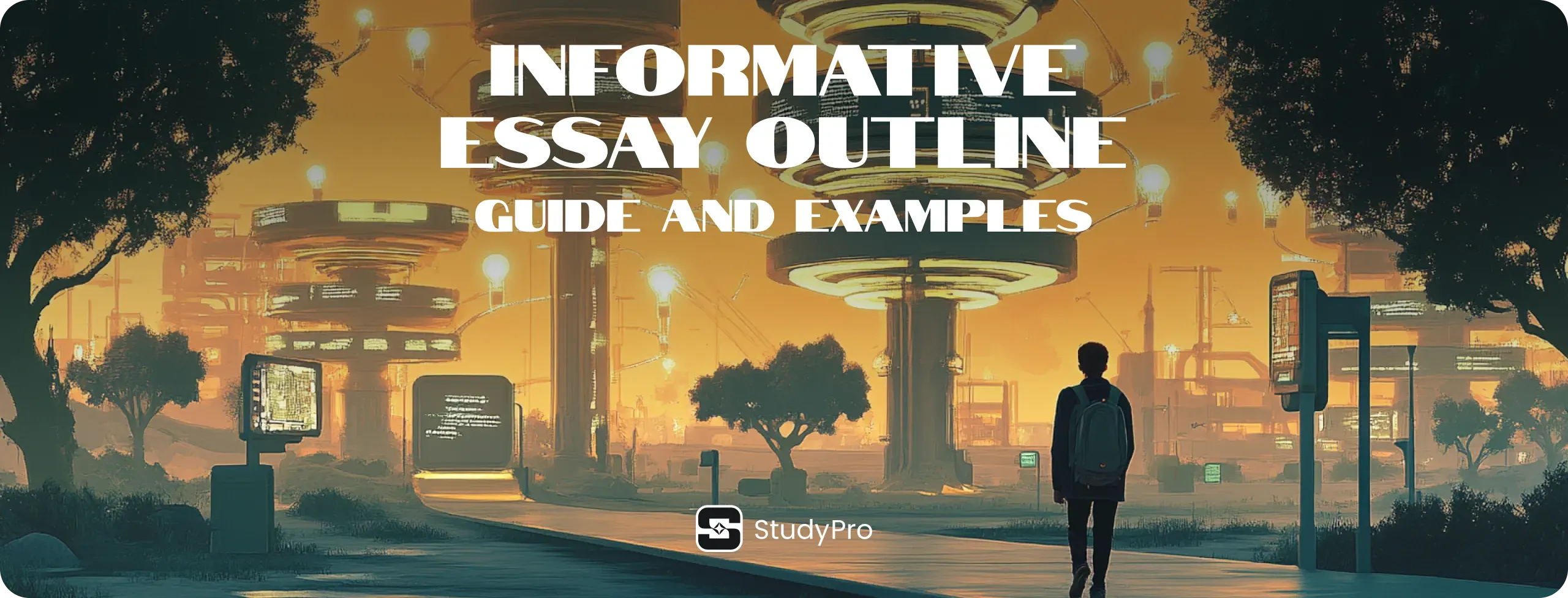Blog>
Structuring an Informative Essay Outline: Guide with Examples
Academic Writing
8 min read
Structuring an Informative Essay Outline: Guide with Examples
A simple and clear guide about informative essay outline, with detailed description of each part with examples.

Written by
Catherine B.
Published on
May 20, 2025
Table of contents
Stay Informed
Get the inside scoop with our latest news!

Thanks for subscribing!
An informative essay aims to share knowledge about a particular subject. These essays typically answer one of the "five Ws": who, what, where, when, or why, regarding a specific topic. They might also explain "how" something works, suggesting a method or process.
It's crucial to remember that personal opinions or attempts to persuade the reader have no place in an informative essay; that's a job for argumentative writing. If your informative essay is well-written and engaging, it might inspire readers to dig deeper into the topic, but that decision is entirely up to them.
Let’s dive into this guide with a structured outline, description and examples.
Meanwhile, you can check the guide with various introduction paragraph examples and learn how to use them properly.
What is an Informative Essay
An informative essay is a type of academic writing that aims to educate the reader on a specific topic.
The key characteristics of an informative essay include:
- Your essay should be based entirely on reliable, researched facts.
- You present information, not opinions, and your tone should remain neutral throughout.
- Organizing your ideas in a structured format helps the reader follow along and understand the subject easily.
This type of essay stands apart from persuasive writing, as its objective is simply to inform, not to convince the reader to adopt a specific viewpoint. This essay format is widely used in educational settings, textbooks, research papers and articles.
How to Choose the Right Topic and Start Your Research
While writing about a broad or popular topic may seem tempting, narrowing your focus will help you provide a more in-depth analysis.
- Choose something you are genuinely interested in. Writing about a subject that excites you will make the writing process more engaging and enjoyable.
- Ensure your topic is relevant to your audience. Additionally, it should be narrow enough to explore within the constraints of your essay but broad enough to provide enough material for discussion.
- Collect enough credible sources to support your research and claims, as they are.
Examples of good informative essay topics:
- The impact of social media on modern communication.
- The impact of artificial intelligence on daily life
- How artificial intelligence is shaping various industries.
- The role of technology in education today.
- The impact of remote learning on educational equity
How to research ideas for an essay?
First of all, ensure that the sources are credible and provide accurate facts.
Here are some tips for effective research:
- Look for books, academic journals, and reputable online resources. Always check the reliability of your sources to avoid misinformation.
- Take organized notes: While researching, jot down key points, statistics, facts, and examples that support your thesis and main ideas.
- Avoid personal opinions: Present facts and evidence that support your topic, avoiding bias or subjective viewpoints.
Informative Essay Outline with Examples
An outline is crucial in organizing your thoughts and ensuring your essay follows a logical progression. Here's a simple outline structure that you can follow for your informative essay:
1. Introduction
The introduction sets the stage for your essay. It should grab the reader's attention and introduce the topic effectively.
What to include in the introduction:
1. Hook: Start with an interesting fact, question, or statement that draws the reader in. The hook should make the reader want to continue reading.
Example: "Did you know that more than 2.7 billion people globally use social media, making it one of the most powerful communication tools in history?"
2. Background Information: Provide context for the topic. Briefly explain the subject's significance and why it's important to understand.
Example: "In the past decade, social media has revolutionized the way we communicate, offering both opportunities and challenges in personal and professional relationships."
3. Thesis Statement: The thesis statement outlines your essay's main purpose or argument. It should present the central idea of the topic and hint at the supporting details you will explore in the body paragraphs.
Example: "This essay will explore the impact of social media on modern communication, examining its role in personal connections, business, and society as a whole."
2. Body Paragraphs
The body paragraphs make up the bulk of your informative essay. Each paragraph should focus on one key idea related to the main topic. The body should present clear, factual information that supports the thesis.
What to include in the body paragraphs:
1. Topic Sentence: Each body paragraph should begin with a topic sentence that introduces the paragraph's main idea. This helps the reader understand what to expect in that section.
Example: "One of the most profound effects of social media is its impact on personal relationships."
2. Supporting Details: Provide supporting facts, examples, statistics, and research to support the topic sentence. These details should be factual and credible.
Example: "Studies show that 40% of young adults feel closer to their friends because of social media, while others report feeling more isolated due to online interactions."
3. Explanation and Analysis: Elaborate on how the supporting details relate to the overall topic. This helps to clarify the information and show how it supports your thesis.
Example: "While social media helps people stay connected across long distances, it has also contributed to feelings of loneliness and disconnection, especially among younger generations."
4. Transition Sentence: End each paragraph with a transition sentence leading to the next paragraph, ensuring the essay flows smoothly.
3. Conclusion
The conclusion is the final section of your informative essay. It should summarize the main points and provide a closing thought.
What to include in the conclusion:
1. Restate the Thesis: Briefly rephrase the thesis statement to remind the reader of the essay's focus.
Example: "In conclusion, social media has undeniably transformed communication, shaping how we connect with others on both personal and professional levels."
2. Summary of Main Points: Summarize the key points discussed in the body paragraphs. This helps to reinforce the facts presented.
Example: "Through its influence on personal relationships, business communication, and societal interaction, social media has changed the landscape of modern communication."
3. Final Thought or Call to Action: End with a thought-provoking statement, question, or suggestion for future exploration. This leaves the reader with something to consider.
Example: "As social media continues to evolve, it will be interesting to see how future generations adapt to these changes and how technology will further shape our communication patterns."
Final Thoughts
Although writing an informative essay may seem challenging, following a clear outline and organizing your thoughts effectively can help you craft an essay that educates and engages your audience.
Remember, an informative essay is about presenting information objectively and well-researched. By using a structured approach, conducting thorough research, and presenting your findings in a logical order, you'll be able to write an essay that is both informative and engaging.
Stay Informed
Get the inside scoop with our latest news!

Thanks for subscribing!


